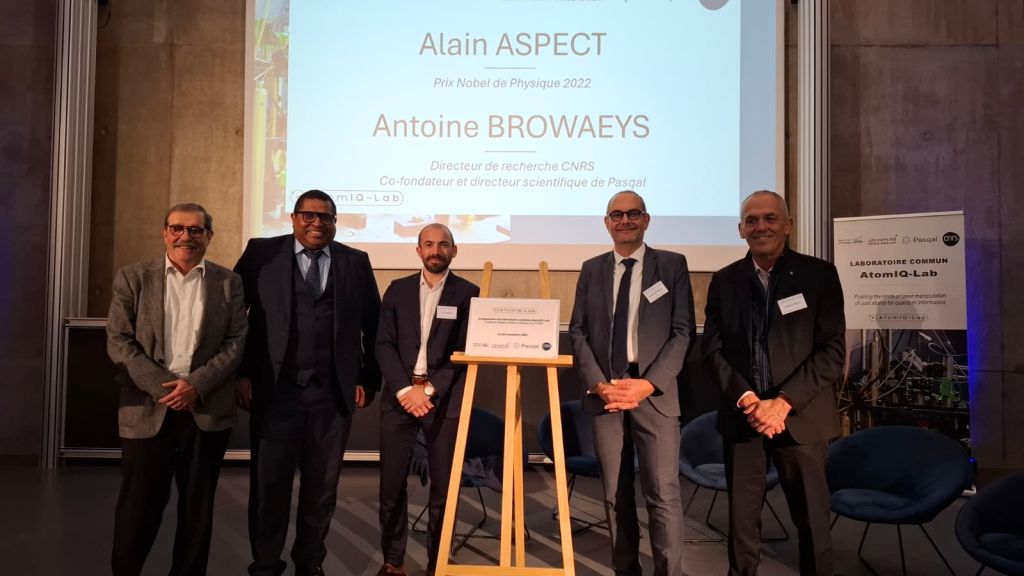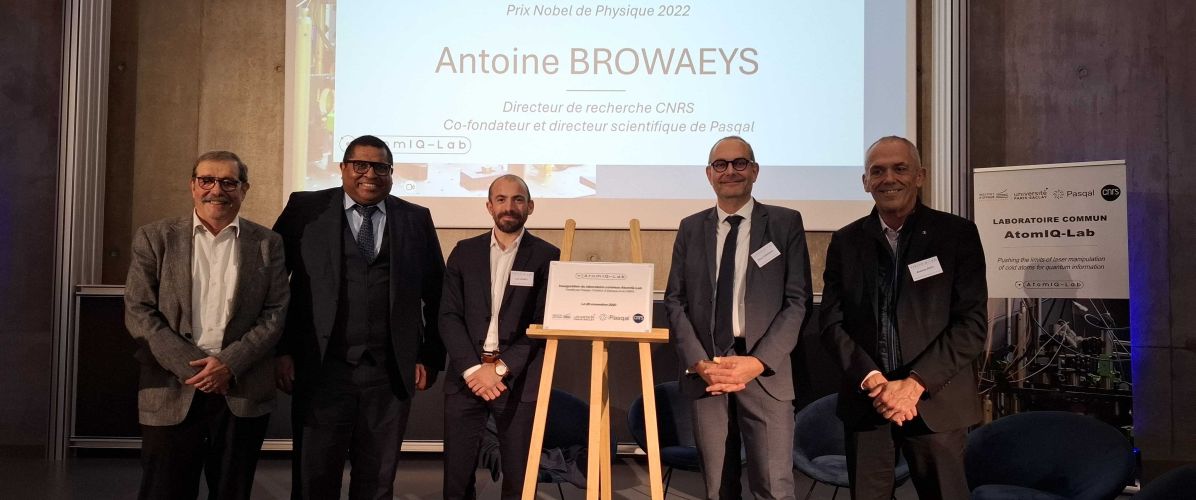- Quantum computing is part of a dynamic that, since the 1980s, has sought to exploit the fundamental properties of quantum mechanics to overcome the limitations of classical computers.
- Specialising in the development of laser-controlled cold atom quantum computers, the scale-up Pasqal is partnering with the CNRS and the Institut d’Optique Graduate School to intensify research and development work in this field.
- The goal of the LabCom AtomIQ-Lab? To optimise the performance of quantum processors with atomic qubits by working on atom manipulation techniques.
The CNRS, l’Institut d’Optique Graduate School and the scaleup Pasqal inaugurated the AtomIQ-Lab associated research laboratory on 26 November 2025. This collaboration between academic research and business aims to push back the technical limits of laser-cooled atom manipulation. The goal is to considerably increase the performance of quantum processors based on this technology, which are marketed by Pasqal, as well as to extend the range of accessible phenomena in the fundamental physics experiments conducted by the team from the Charles Fabry Laboratory (CNRS/Institut d’Optique).
The origin of tomorrow’s computers: quantum mechanics
Suggested in the 1980s by Richard Feynman, winner of the 1965 Nobel Prize in Physics, the quantum computer began an amazing revolution in high performance computing. Unlike usual machines, such as computers or smartphones, which manipulate information thanks to bits, representing either 1 or 0, quantum computers function with qubits, which represent either 1 or 0 – or both at the same time. These surprising properties of quantum superposition and intrication1 can double overall computing power with each additional qubit, thereby extending the range of what is calculable. Thanks to their exponential information processing capacity, quantum computers promise — in a future that is more or less near — execution speeds that are unattainable by current supercomputers, along with greater energy-saving performance.
Their deployment in computing centres could have a considerable impact in numerous fields, such as artificial intelligence, logistical computing, cybersecurity, and weather forecasting.
Atomic qubits, a promising approach for pushing back the limits of high performance computing
The scaleup Pasqal, which grew out of the Charles Fabry Laboratory (CNRS/Institut d’Optique) — and was co-founded in 2019 by the winner of the 2022 Nobel Prize in Physics Alain Aspect — emerged from the French tradition of academic research excellence in atomic physics. The performance of quantum computers2 is based on qubits consisting of atoms, a naturally abundant resource, cooled and manipulated by lasers. The properties of these lasers, which are conferred by highly precise settings, enable them to cool atoms, to move them as part of the automated assembly of qubit registers, and to then manipulate these qubits and measure their state, all in a fraction of a second.

Register of approximately 500 atomic qubits assembled and controlled by laser, obtained in a Pasqal quantum computer.
© Pasqal
A collaboration between academic research and business to build the computers of the future
Located at the heart of l’Université Paris-Saclay, this associated research laboratory between the enterprise Pasqal, the CNRS, and l’Institut d’Optique seeks to considerably increase the performance of quantum processors based on this technology. To this end, the team of scientists and engineers will work for four years on developing more effective techniques for laser-cooled atom manipulation. The goal is to reduce the time it takes to generate such registers, thereby accelerating the processor’s overall execution time.
The LabCom also aims, over the long term, to explore quantum photonics, with a view to developing quantum computers that use photons as qubits.
Its creation represents a new step forward in conserving a global competitive edge in a strategic field. Through its policy of innovation and support for creating associated research laboratories and start-ups in quantum technology4, the CNRS directly contributes to strengthening French technological sovereignty.
“I am delighted with the creation of the AtomIQ-Lab LabCom with Pasqal, the result of a long-standing relationship of trust between public research and a company that grew out of our shared laboratory with the Institut d’Optique. It is one of the most successful forms of collaboration between the academic and economic worlds. This new partnership will mobilise our scientists for four years to take on a major industrial challenge: to participate in building the computer of the future by pushing the limits of laser manipulation of cold atoms, at the heart of quantum technologies. This is further proof of the CNRS’s ability to engage its talents in a strategic field“, said Antoine Petit, President and CEO of the CNRS.
“The Institut d’Optique is delighted to contribute to the creation of this joint laboratory with Pasqal and the CNRS, at the heart of the Paris-Saclay University campus. This project fully embodies the spirit of public-private partnership in research and innovation, which has been part of our institution’s DNA for over a century and opens up fascinating prospects in the field of quantum technologies“, emphasises Rémi Carminati, Director General of the Institut d’Optique.
“Pasqal is proud to partner with the CNRS and the Institut d’Optique to create AtomIQ-Lab. As a spin-off of the CNRS and the Institut d’Optique, this partnership illustrates the strength of the relationship between public research and industry, which is essential for transforming French scientific excellence into concrete technological advances. Together, we are laying the foundations for a new era in quantum computing“, adds Loïc Henriet, CEO of Pasqal.

From left to right: Alain Aspect, Emeritus Research Director at CNRS and co-founder of Pasqal; Camille Galap, President of Université Paris-Saclay; Loïc Henriet, Chief Executive Officer of Pasqal; Eric Carminati, Chief Executive Officer of the Institut d’Optique; Antoine Petit, Chairman and Chief Executive Officer of CNRS. © CNRS
Notes
- This surprising physical effect was theorised by Albert Einstein, Boris Podolsky, and Nathan Rosen in 1935, and christened “quantum entanglement” that same year by Erwin Schrödinger. In the 1980s, Alain Aspect proved that two particles that had interacted conserve a correlation, regardless of the distance between them. The modifications made to one impact the other.
- With a capacity of 1,000 qubits. Pasqal plans to reach 10,000 qubits in the coming years. Learn more: https://www.pasqal.com/technology/roadmap/
- Invented in 1986 by Arthur Ashkin, winner of the 2018 Nobel Prize in Physics.
- Further information is available in the press kit diffused as part of the CNRS’s participation in the 2025 VivaTechnology tech event: www.cnrs.fr/en/press/addressing-challenges-society-transition-cnrs-vivatech
About the CNRS
A major player in fundamental research on a global scale, the French National Centre for Scientific Research (CNRS) is the only French organization active in all scientific fields. Its unique position as a multispecialist enables it to bring together different scientific disciplines to illuminate and address the challenges of the contemporary world, in collaboration with public and socio-economic stakeholders. Together, the sciences serve sustainable progress that benefits society as a whole. www.cnrs.fr
About Institut d’Optique Graduate School
Founded in 1917, Institut d’Optique Graduate School is a world leader in research, training, and innovation in photonics and quantum technologies.
Member of Université Paris-Saclay, Institut d’Optique trains some of the most innovative physicist-engineers in the corporate and academic world. Its international reputation is based on its research and technology transfer, as well as the quality of the education it provides. Institut d’Optique has three campuses, in Paris-Saclay, Bordeaux, and Saint-Etienne, each with strong links to the local university and to the local industrial eco-system in photonics and quantum technologies. It is a member of Université Paris-Saclay. (www.institutoptique.fr)
Contacts :
CNRS Press | Manon Landurant | T +33 1 44 96 51 37 | manon.landurant@cnrs.fr
Institut d’Optique Press | Clémentine Bouyé | T +33 6 73 22 17 60 | clémentine.bouyé@institutoptique.fr
Pasqal Press | Florence Vallot | T +33 6 07 03 97 10 | florence.vallot@pasqal.com


